The opioid crisis and the punitively high cost of insulin seem like two sides of the same terrible coin: when healthcare is more about profit than healing. We are barely beginning to understand the full scope of the devastation wrought by the corporate pharmaceutical companies who prioritized stock price over pain relief and tore apart generations of American families. Below are ten books that shed a little light on that.
Article continues after advertisement
*
Sam Quinones, Dreamland: The True Tale of America’s Opiate Epidemic (2015)
In Dreamland, journalist and author Sam Quinones “trace[s] connections between pill-pushing doctors in Portsmouth, Ohio, and heroin dealers from a town in Mexico… show[ing] us that doctors laid the groundwork for the influx of black-tar heroin by getting patients so hooked on OxyContin that they were desperate enough to turn to cheaper dope, any dope, when those pills ran out” (NYT Book Review).
Throughout Dreamland, Quinones’ thorough investigative reporting lends credence to a harrowing, hair-raising narrative. Quinones is, according to the SF Chronicle Book Review, “the most original writer on Mexico and the border out there.” The book begins at a pool in Portsmouth, Ohio called Dreamland; for decades Dreamland was the beating heart of this blue-collar American town. Today, Portsmouth is “a town of abandoned buildings at the edge of the Ohio River”—a portentous and tragic victim of the story to follow. In 2021, Sam Quinones published a second book about America’s drug crisis, titled The Least of Us: True Tales of America and Hope in the Time of Fentanyl and Meth, for further reading.
2015 NBCC Award for General Nonfiction • NYT Bestseller • PEN/John Kenneth Galbraith Award • Slate’s 50 Best Nonfiction Books of the Past 25 Years
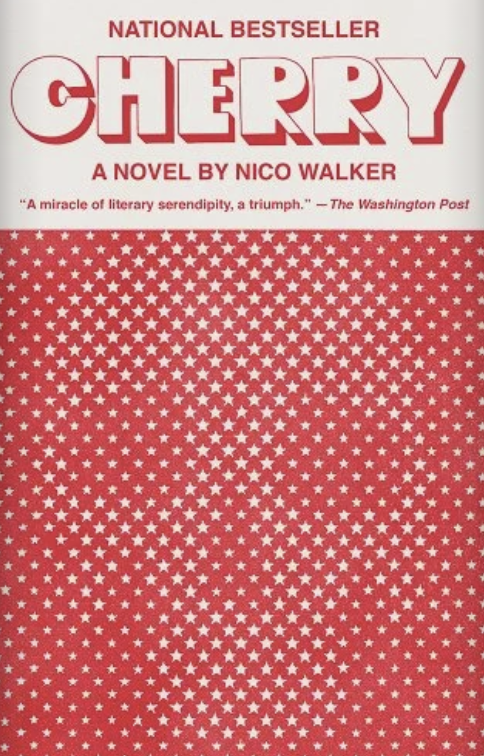
Nico Walker, Cherry (2018)
Christian Lorentzen described Nico Walker’s Cherry “the first great novel of the opioid epidemic,” drawing comparisons to greats like Denis Johnson. The book, semi-autobiographically, narrates a nameless protagonist’s time in college, during the War in Iraq, and afterwards, home in America during the opioid crisis, as he struggles with addiction and robs banks. Writer and veteran Walker wrote the book from prison where he was doing time for bank robbery. “There’s a vivid, repulsive truth in the way Walker renders his subjects—a sort of social truth, stripped of morality, which is rare and riveting when it comes to the subjects of opioid addiction, intimate everyday cruelty, and endless, meaningless war.” –The New Yorker
PEN/Hemingway Award Finalist • National Bestseller
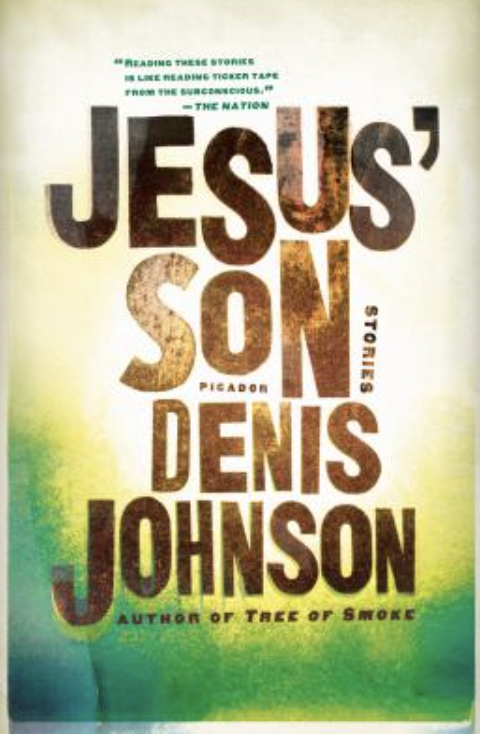
Denis Johnson, Jesus’ Son (1992)
Denis Johnson was an American great. Jesus’ Son is a classic of 20th-century American literature, a linked short story cycle narrated by a young man referred to only as “Fuckhead.” In the NYT, Johnson’s prose is judiciously compared to Beckett’s “in the trapdoor cadences and self-deprecating humor of their sentences” and it’s true. The sentences in Jesus’ Son are near perfect. They toggle between reverent in content, irreverent in style, and irreverent in content, reverent in style, strange, sibylline, human, profane, and they pile up into stories that so “flagrantly risk[] ‘insensitivity’ in an effort to depict the pathology of addiction” (NYT). So thoroughly do they do it that they might never leave you.
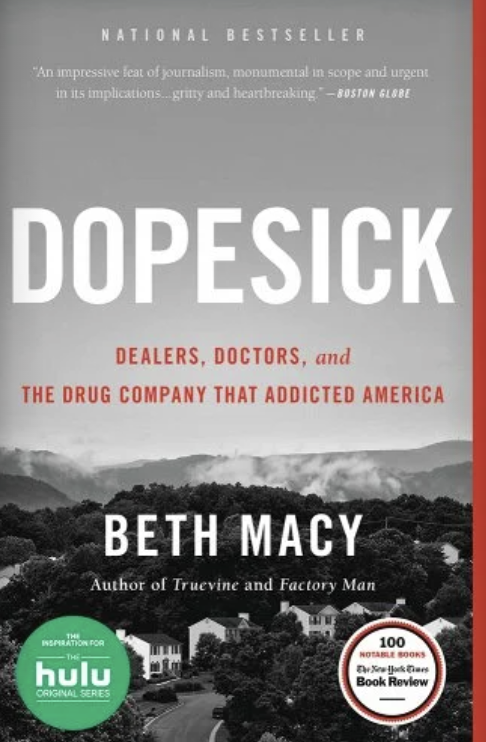
Beth Macy, Dopesick: Dealers, Doctors, and the Drug Company That Addicted America (2018)
Dopesick is a powerful exploration of America’s opioid epidemic, tracing it from the beginning, with the 1996 release of OxyContin, to its tragic effects on people and families in Appalachia, where Beth Macy, journalist and author, lives herself, in Roanoke, VA. Dopesick “unfolds with all the pace of a thriller,” “it may make you weep; it will almost certainly make you angry” (The Guardian). Macy is a strong reporter, but what simmers under the surface of Dopesick is a rage both political and personal, as Macy writes about her own community. “Macy’s strengths as a reporter are on full display when she talks to people, gaining the trust of chastened users, grieving families, exhausted medical workers and even a convicted heroin dealer” (NYT Book Review). In 2021, the book was adapted into a Hulu mini-series.
NYT Bestseller • 2018 LA Times Book Prize for Science & Technology • Shortlisted for the 2019 Andrew Carnegie Medal for Excellence in Nonfiction
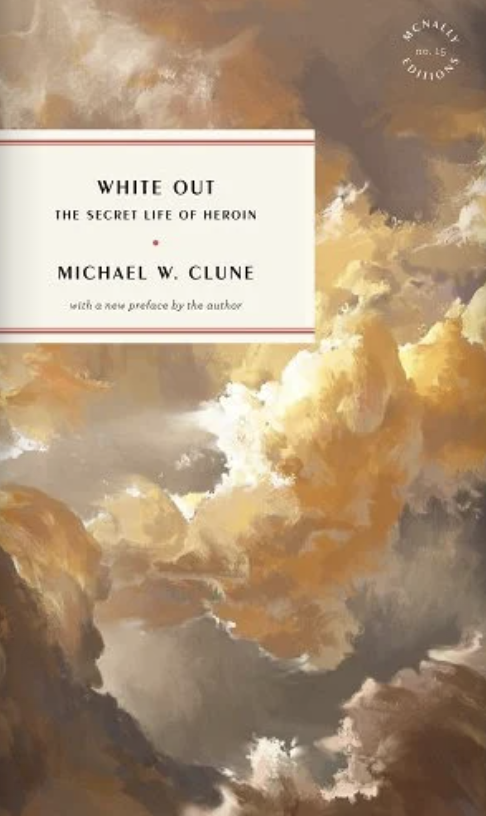
Michael W. Clune, White Out: The Secret Life of Heroin (2013)
White Out is a memoir by Michael W. Clune—writer, critic and humanities professor—about his own heroin addiction and recovery. It seems impossible to apply a taxonomical word like “memoir” to this book; It “reads like a lost modernist novel,” “the ostensible subject [addiction] serving as pretext for the play of language and the careful chiseling of a bruised, ironic, complexly self-despising sensibility” (The Millions, The Nation). Somehow Clune’s recount is lyrical, dark, funny, “honest and dangerous.” The title refers to how heroin creates a hole in your memory, “a white out,” such that every time you use it is the first time. “The unusual risk taken by Clune’s unusually good addiction memoir is its enduring lyrical reverence for heroin” (The New Yorker); “It is a recovery narrative, but there is no redemption arc” (The Nation). It’s no question that Clune’s White Out, within the canon of addiction literature, is entirely new.
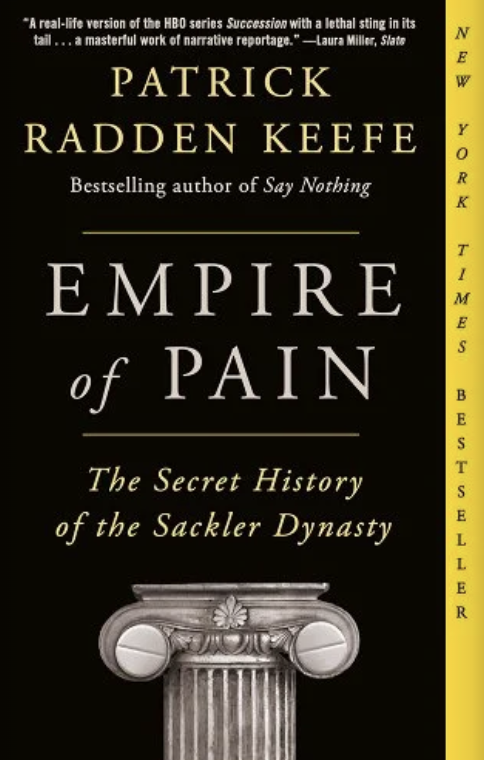
Patrick Radden Keefe, Empire of Pain: The Secret History of the Sackler Dynasty (2021)
From investigative journalist, staff writer at the New Yorker, and author of bestselling and award-winning Say Nothing, Patrick Radden Keefe’s Empire of Pain tells the history of the family behind Purdue Pharma, painting “a devastating portrait of a family consumed by greed and unwilling to take the slightest responsibility or show the least sympathy for what it wrought” that is “all the more damning for its stark lucidity” (NYT). Empire of Pain is the history of the perpetrators, the Sackler Family.
NYT Bestseller • Winner of the Baillie Gifford Prize for Non-Fiction
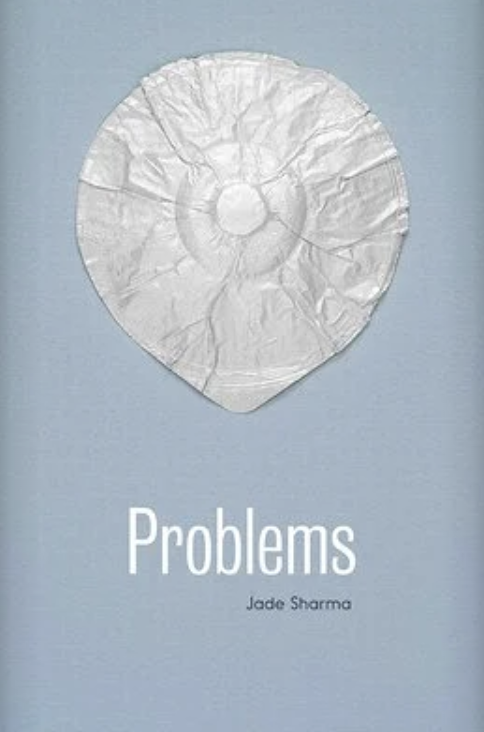
Jade Sharma, Problems (2016)
The late Jade Sharma’s debut novel, Problems, “is written so well that the relentless and destructive rhythm of heroin abuse seems calming, metaphysical, and occasionally even funny” (Kirkus). Sharma’s narrator Maya has “a voice that is equal parts irreverent and hilarious, depressive and hopeful” (Bustle). Problems “takes every tired trope about addiction and recovery, ‘likeable’ characters, and redemption narratives, and blows them to pieces.” In his review of Nico Walker’s Cherry, Christian Lorentzen calls Jade Sharma’s Problems “a meticulous narrative of opioid addiction, one of the most detailed account I’ve seen in American lit” (Vulture).
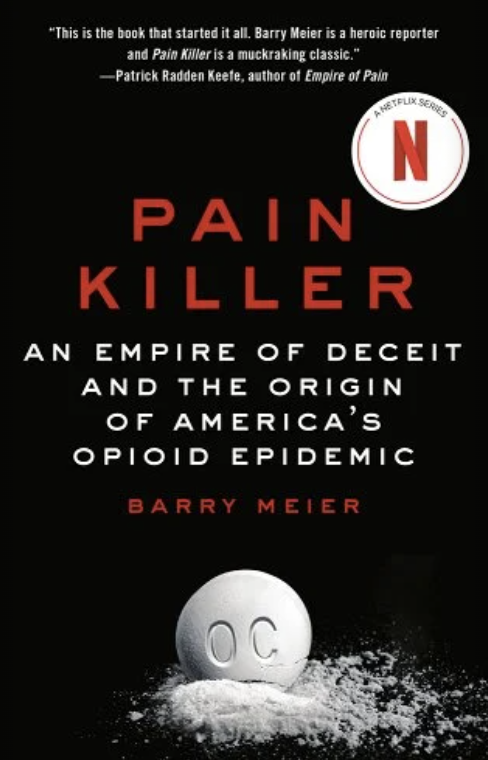
Barry Meier, Pain Killer: An Empire of Deceit and the Origin of America’s Opioid Epidemic (2018)
Pulitzer Prize-winning New York Times reporter Barry Meier first exposed the roots of the opioid epidemic in 2003. “This is the book that started it all. Barry Meier is a heroic reporter and Pain Killer is a muckraking classic” (Patrick Radden Keefe, author of Empire of Pain). This updated 2018 version of Meier’s original 2003 book breaks even newer ground, built now on a decades-long investigation. “Equal parts crime thriller, medical detective story, and business exposé, Pain Killer is a hard-hitting look at how a supposed wonder drug became the gateway drug to a national tragedy.”
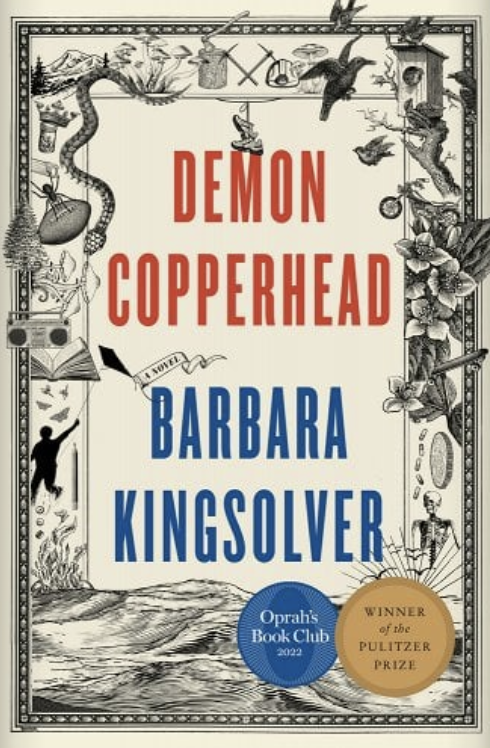
Barbara Kingsolver, Demon Copperhead (2022)
Demon Copperhead is Barbara Kingsolver’s retelling of Charles Dickens’ David Copperfield. Instead of the institutional poverty of Victorian England, it is Appalachia, where Kingsolver is from, at the beginning of the opioid epidemic. In fact, she got the idea for the book sitting at the very desk where Dickens wrote much of David Copperfield in England. She thought about how she and Dickens were in the same boat, wanting to tell their own story–though it was a story people might not want to hear. Kingsolver claims that Dickens spoke to her, saying: “Let the kid tell the story. No one doubts the child” (NYT). And so she did. The book tells the story of Demon Copperhead’s life in his own “wise, unwavering voice,” (Pulitzer Prize) Demon’s narration is “one of the great virtuosic vocal performances” (Richard Powers, author of The Overstory). “Demon is a voice for the ages—akin to Huck Finn or Holden Caulfield—only even more resilient” (Beth Macy, author of Dopesick).
Winner of 2023 Pulitzer Prize for Fiction • NYT Bestseller • Winner of Women’s Prize for Fiction
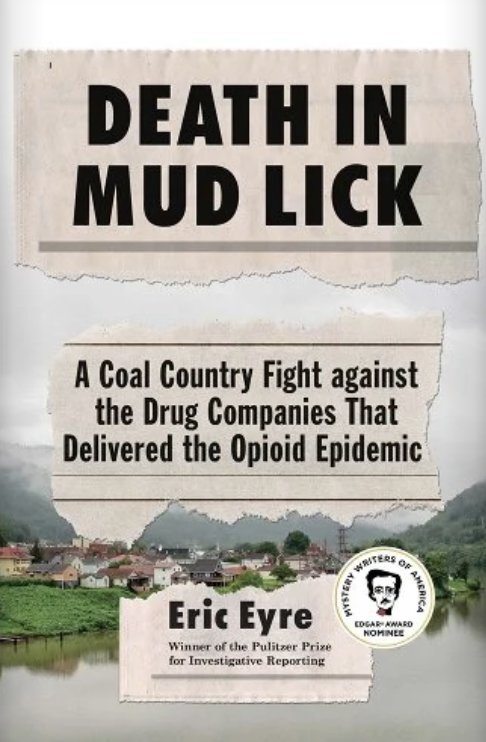
Eric Eyre, Death in Mud Lick: A Coal Country Fight against the Drug Companies That Delivered the Opioid Epidemic (2020)
In 2017, Eric Eyre’s investigation into massive shipments of opioids to West Virginia’s southern coalfields was awarded a Pulitzer Prize. It made Charleston Gazette-Mail the smallest newspaper ever to win for investigative reporting. The book details the fallout of breaking that story for the newspaper. Eyre takes his reporting expertise to uncover how and why “pharmacies in West Virginia filled more prescriptions per capita than any other state”; “he organizes his book as a simmering thriller, in which villain after villain is introduced,” “there are lawsuits and court fights,” “skulduggery and a mysterious manila envelope” (NYT). And—this crisis’ trademark—“unexpungeable grief.”
A New York Times Critics’ Top Ten Book of the Year • 2021 Edgar Award Winner Best Fact Crime • A Lit Hub Best Book of The Year
